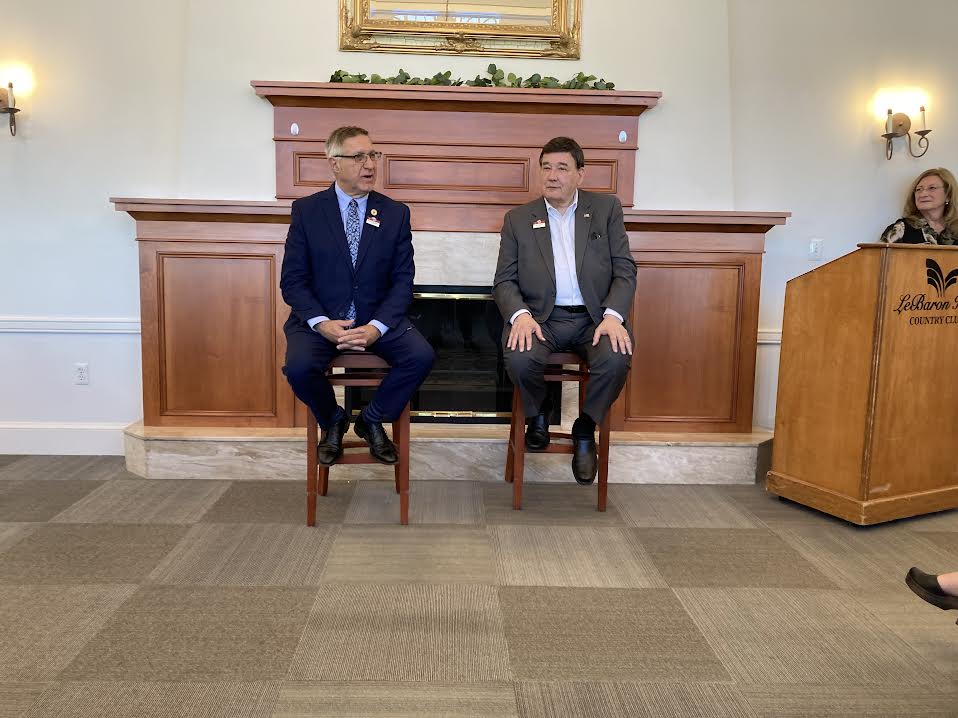Legislators long for days of unity between political parties
LAKEVILLE — Education, immigration, how food servers are paid, and the current state of American politics were all on the menu at the Cranberry Country Chamber of Commerce’s Oct. 17 fall Legislative Luncheon.
Retiring state Sen. Marc Pacheco and longtime Sen. Michael Rodrigues both denounced how polarized politics have become in the years since they first won office.
With “15% on each extreme,” Rodrigues said, “it’s hard as hell to operate in the middle.”
“We really have to get back to a point in time when both parties could sit at a table and come up with practical solutions,” Pacheco said. Considered the “Dean of the Massachusetts Senate,” the Taunton Democrat has represented the sprawling – and periodically reshaped – 3rd Bristol & Plymouth District since 1993.
The district currently includes the towns of Wareham, Marion and Middleboro and stretches west through Seekonk. Sitting in the LeBaron Hills Country Club, Pacheco noted that Lakeville used to be part of his district.
Both legislators were strongly in agreement with the Chamber’s stance against referendum Question 5, which would eliminate the “tipped wage.” They and Chamber officials noted that the tipped workers that the effort would supposedly benefit are almost unanimously fearful that it would dramatically reduce the amount of money they make.
The senators disagreed on Question 2, which would repeal the MCAS exams as a requirement for high school graduation. Pacheco – noting that he co-sponsored the 1993 education reform legislation that established the tests – reminded the gathering that the “S” in MCAS stands for “System.”
Teachers, he said, now point out: “You told us we were going to have a system. We’re just teaching to a test.” Pacheco said he is in favor of getting rid of the graduation requirement and “going back and making sure the system is in place.”
Rodrigues prefaced his remarks on ballot questions by saying that referendums are “the worst way to make legislation” and that he would “generally vote ‘no’ on all.” But he then went on to defend the MCAS tests: The tests have helped “make Massachusetts the No. 1 state in the country for education.” If the tests are abolished, “We’re not going to go back to a ‘system.’ We’re going to go back to 1993.”
Rodrigues’ 1st Bristol & Plymouth District runs from Rochester and Lakeville west to the Rhode Island line. On topics from housing to gun control, be peppered his remarks with references to Westport, where he grew up and currently lives.
He remembered how as a boy he and a friend would sling shotguns across their shoulders to ride their bikes to shoot clay pigeons.
Both senators refused to blame the state’s housing prices and housing shortage on the influx of migrants. “We need to increase housing supply,” Rodrigues said, noting the barriers to construction that are erected at the local level. Referencing his hometown of Westport, he quipped: “The last person who moved to Westport wants to be the last person to move to Westport.’’
On immigration, Pacheco circled back to his dismay at the polarization that has deadlocked national politics. The last significant reform of the country’s immigration system happened during Ronald Reagan’s administration when the Republican president was willing to sit down with Democratic Speaker of the House Tip O’Neill and hash out a compromise. Today’s uncompromising politics, he said, “let the perfect get in the way of the good.”
Having decided not to run for reelection this year, he prefaced remarks on the presidential race with “I don’t have to be worried about being re-elected.” But, he said, his party has a strong case to make nationally. Regarding the standard of living, the United States “is doing better now than almost any place in the world.”












